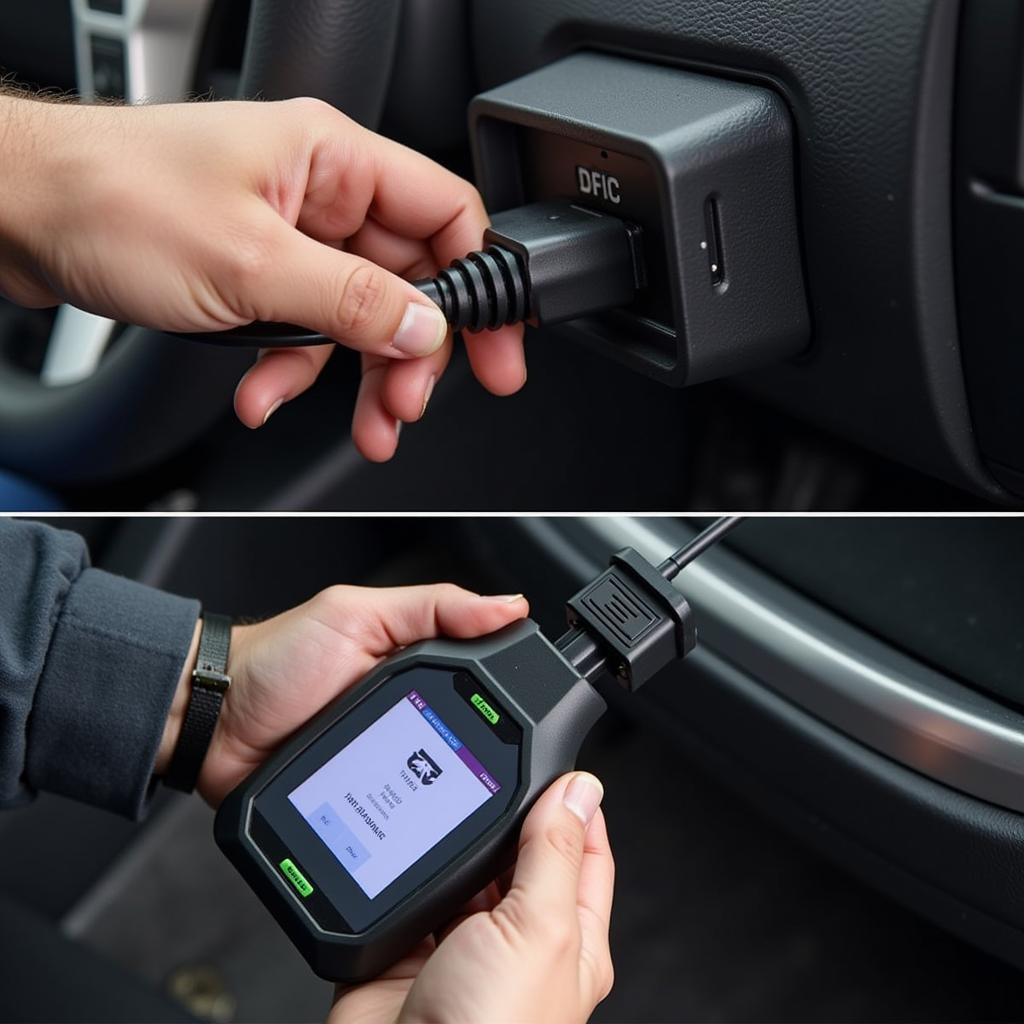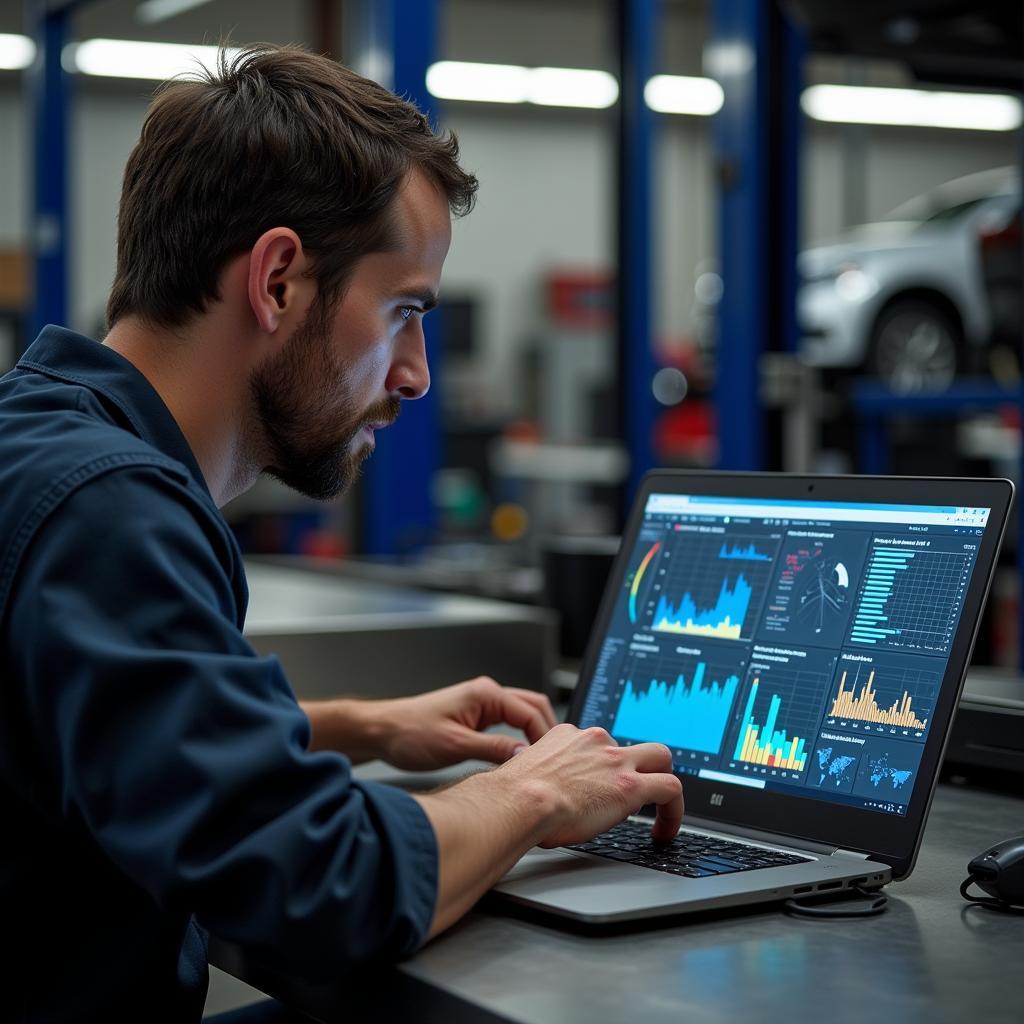Understanding how long to run a diagnostic on your car can be confusing. Is it a quick scan, or do you need to leave it at the mechanic all day? This guide will break down everything you need to know about car diagnostic tests, their duration, and factors that can affect the timeframe.
Factors Influencing Diagnostic Test Time
While the thought of a car diagnostic test might conjure images of mechanics huddled around complex machinery for hours, the actual duration is influenced by several factors:
- Type of Diagnostic Tool: Basic OBD2 scanners, often used for quick check-engine light scans, can be significantly faster than professional-grade tools with advanced functionalities.
- Complexity of the Issue: A simple loose gas cap will be diagnosed much faster than an intermittent electrical issue requiring extensive testing.
- Mechanic’s Expertise: An experienced mechanic familiar with your car model can often pinpoint problems faster than someone less experienced.
Average Diagnostic Test Duration
Generally, a basic car diagnostic test takes between 30 minutes to an hour. This usually involves connecting a diagnostic scanner to your car’s OBD2 port and reading the error codes.
However, keep in mind that this is just an average. If the issue is more complex, the mechanic might need more time to:
- Interpret Error Codes: Deciphering what the codes mean and their underlying cause.
- Perform Visual Inspections: Checking for visible damage or loose components.
- Conduct Further Tests: Running additional tests based on the initial findings.
For example, a simple code reading might reveal a problem with the oxygen sensor. However, confirming the diagnosis and ruling out other potential culprits might require additional tests and visual inspections, extending the diagnostic process.
 Car Diagnostic Test in Progress
Car Diagnostic Test in Progress
When Diagnostic Tests Take Longer
In certain situations, car diagnostic tests can take several hours or even days. This often happens when:
- The Problem Is Intermittent: Identifying intermittent problems, like electrical faults that occur sporadically, requires more time and observation.
- Multiple Issues Exist: Diagnosing multiple issues simultaneously can be like solving a puzzle, requiring the mechanic to address each issue systematically.
- Specialized Equipment Is Needed: Some issues necessitate specialized equipment or software, which might involve ordering parts or seeking assistance from dealerships.
While waiting longer for a diagnosis can be frustrating, remember that a thorough diagnosis is crucial for accurate repairs. Rushing the process can lead to misdiagnoses and unnecessary repairs, costing you more time and money in the long run.
Understanding the Diagnostic Process
To further grasp the timeframe involved, let’s delve into a simplified breakdown of a typical car diagnostic process:
- Connecting the Scanner: The mechanic connects the diagnostic tool to your car’s OBD2 port, usually located under the dashboard on the driver’s side.
- Reading Error Codes: The scanner retrieves error codes stored in your car’s computer, indicating potential malfunctions.
- Interpreting Codes: The mechanic deciphers the codes, understanding their meaning and potential causes.
- Clearing Codes: After noting the codes, the mechanic clears them from the system.
- Test Drive (If Necessary): A test drive might be necessary to replicate the issue or observe the car’s behavior.
- Further Diagnosis: Based on the initial findings, the mechanic conducts further tests, inspections, or consultations to pinpoint the exact problem.
 Mechanic Analyzing Diagnostic Results on a Laptop
Mechanic Analyzing Diagnostic Results on a Laptop
What Does a Diagnostic Test on a Car Tell You?
A car diagnostic test is essentially a conversation with your car’s computer. It reveals a wealth of information, including:
- Error Codes: These codes act as clues, indicating specific areas or systems experiencing malfunctions.
- Sensor Data: The test retrieves real-time data from various sensors, providing insights into your car’s performance and health.
- Historical Data: Some advanced scanners access historical data, revealing past issues and aiding in identifying recurring problems.
Understanding this information is crucial for effective repairs. It allows the mechanic to formulate a targeted repair plan, saving you from unnecessary replacements and expenses.
Do You Need a Diagnostic Test?
If your car’s check engine light is on or you’re experiencing performance issues, a diagnostic test is often the first step towards resolution. Here are some common scenarios where a diagnostic test is recommended:
- Illuminated Check Engine Light: This light signals a potential problem detected by your car’s computer.
- Unusual Noises: Unexplained noises like knocking, grinding, or hissing can indicate underlying mechanical issues.
- Performance Problems: Issues like rough idling, stalling, decreased fuel efficiency, or reduced power often warrant a diagnostic test.
Early diagnosis can prevent minor problems from escalating into major repairs. Regular diagnostic checks can also provide valuable insights into your car’s overall health, allowing you to address potential issues proactively.
DiagFixPro: Your Trusted Partner in Car Diagnostics
Navigating the world of car diagnostics can be challenging. If you’re facing car troubles or have questions about diagnostic tests, DiagFixPro is here to help.
We offer a wealth of information on car diagnostics, from understanding error codes to finding reliable mechanics in your area.
- Learn more about what a diagnostic test on a car tell you.
- Find out where you can get a diagnostic test on your car.
- Explore our resources on how to run a car diagnostic.
Remember, a well-informed car owner is an empowered car owner. Equip yourself with knowledge and make informed decisions about your vehicle’s maintenance.
Conclusion
Understanding “how long to run a diagnostic on a car” involves considering various factors, from the diagnostic tool used to the complexity of the issue. While a basic scan might take an hour, resolving intricate problems can extend the timeframe.
However, remember that a thorough diagnosis is an investment. It ensures accurate repairs, prevents unnecessary expenses, and keeps your car running smoothly for miles to come.
For all your car diagnostic needs and to explore our comprehensive resources, visit DiagFixPro today!
FAQs
Q1: Can I run a car diagnostic test myself?
Yes, basic OBD2 scanners are available for DIY enthusiasts. However, interpreting codes and conducting further tests often require professional expertise.
Q2: How much does a car diagnostic test cost?
Prices vary depending on location and mechanic. Some mechanics offer free or discounted diagnostic tests with repairs.
Q3: Do I need a diagnostic test every time my check engine light flashes?
While a flashing check engine light usually indicates a serious problem, a diagnostic test can confirm the issue and its severity.
Q4: Can a diagnostic test detect problems with my car’s transmission?
Yes, modern car diagnostic tools can detect issues with various systems, including the transmission.
Q5: What is the difference between a car diagnostic test and a pre-purchase inspection?
A diagnostic test focuses on the car’s computer system, while a pre-purchase inspection is a comprehensive assessment of the vehicle’s overall condition.
Q6: How often should I get a car diagnostic test?
It’s generally recommended to have your car diagnosed annually or whenever you experience performance issues.
Common Diagnostic Test Scenarios
- Scenario 1: You notice your car is sluggish and consuming more fuel than usual. A diagnostic test might reveal a faulty oxygen sensor impacting engine performance.
- Scenario 2: Your car struggles to start, especially in cold weather. A diagnostic test could pinpoint a weak battery or a failing starter motor.
- Scenario 3: Your check engine light is on, but your car seems to be running fine. A diagnostic test can identify hidden issues before they escalate into major problems.
For more information on car diagnostics and to find helpful resources, explore other articles on our website:
Need personalized assistance with your car’s diagnostics? Our team of experts is here to help.
Contact us via WhatsApp: +1(641)206-8880 or Email: [email protected] for 24/7 support.

Leave a Reply